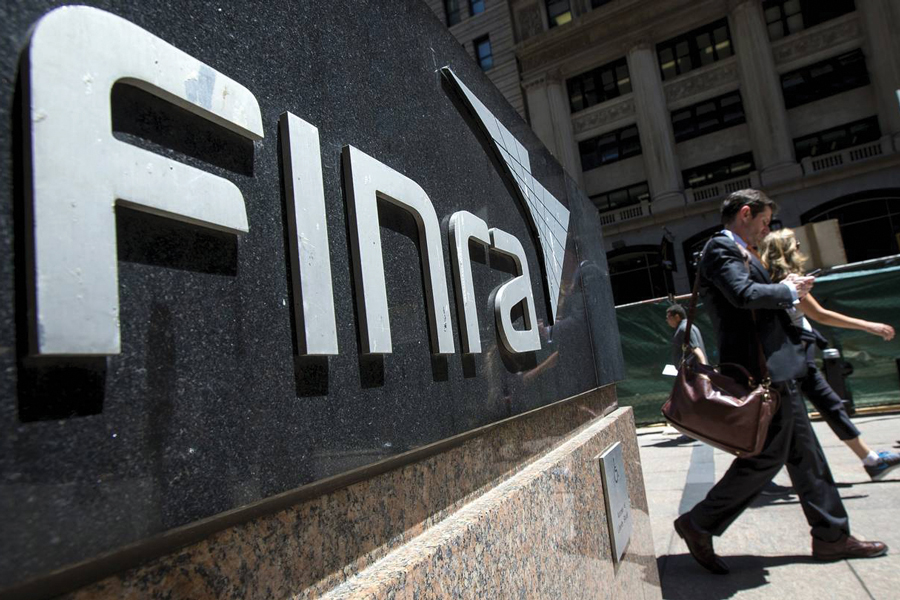

Finra is probing registered representatives who have obtained coronavirus relief loans for possible violations related to work they do outside their brokerage firms.
The Financial Industry Regulatory Authority Inc. is examining reps who took loans through the Paycheck Protection Program and other aid initiatives. The PPP, which was renewed earlier this month as part of a $900 billion legislative package, provides financing for small businesses that have been hit hard by the pandemic.
But Finra is concerned that some reps are receiving federal financial support connected to work they’re doing outside of their brokerage jobs.
“Finra is proactively looking at registered representatives that obtained loans through undisclosed outside business activities,” a Finra spokesperson wrote in an email.
Last fall, Wells Fargo fired 100 employees for abusing coronavirus aid and JPMorgan investigated employees and customers for misusing relief funding.
Finra’s exams are not part of a sweep. They’re targeted at individual reps who have received coronavirus aid.
“Finra’s National Cause and Financial Crimes Detection Program is conducting an examination with respect to your receipt of a PPP Loan,” says a recent exam letter obtained by InvestmentNews. “The purpose of this examination is to determine whether violations of federal securities laws or Finra rules have occurred.”
The letter goes on to request documentation and other information in 13 areas, including questions related to outside business activities in which a rep has participated since 2015 and whether they were disclosed to the rep’s brokerage.
The PPP loan probe is unusual, said Max Schatzow, an attorney at Stark & Stark. A rep for one of his brokerage clients has received a Finra exam letter.
“It seems like it’s outside the typical examination parameters for Finra,” Schatzow said. “None of the requests [in the exam letter] are relevant to investment recommendations or determining whether there have been violations of Finra rules or federal securities laws.”
Brokerages and investment advisory firms that took PPP loans have endured some criticism. Loans through the PPP program, which are forgivable, are meant to bolster small businesses that need help maintaining their payrolls due to the economic cessation caused by the pandemic.
Finra has said that a registered rep who has taken a PPP loan does not need to disclose it on Form U4 if the loan has been forgiven. The Securities and Exchange Commission has said that investment advisory firms should disclose PPP loans if they are primarily used to pay employees who provide advisory services to clients or if the firm would have trouble meeting contractual obligations without the loan.
Brokerages and advice firms that generate revenue based on investment product sales and assets under management presumably are surviving the pandemic thanks to the record-breaking market surge over the last several months.
The fact that the market has bounced back — and then some — from its collapse immediately after the pandemic hit last March may make it more difficult for brokerages to assert that they need a PPP loan to stay afloat.
“It’s a lot harder to make that representation now in good faith than it was nine months ago,” Schatzow said.

Summit Financial unveiled a suite of eight new tools, including AI lead gen and digital marketing software, while MassMutual forges a new partnership with Orion.

A new analysis shows the number of actions plummeting over a six-month period, potentially due to changing priorities and staffing reductions at the agency.

The strategic merger of equals with the $27 billion RIA firm in Los Angeles marks what could be the largest unification of the summer 2025 M&A season.

Report highlights lack of options for those faced with emergency expenses.

However, Raymond James has had success recruiting Commonwealth advisors.
Orion's Tom Wilson on delivering coordinated, high-touch service in a world where returns alone no longer set you apart.
Barely a decade old, registered index-linked annuities have quickly surged in popularity, thanks to their unique blend of protection and growth potential—an appealing option for investors looking to chart a steadier course through today's choppy market waters, says Myles Lambert, Brighthouse Financial.
